More On Unlawful Command Influence
There's essentially no analogue in the civilian justice system. Here's why.
Yesterday, I passed along word that a Marine staff sergeant’s sexual assault conviction had been overturned on appeal on grounds of unlawful command influence. The discussion in the comment thread, quite naturally, is perplexed by the whole thing because, as I’ve noted in several postings on the topic, both President Obama and Commandant of the Marine Corps Jim Amos were absolutely sending the right message about a real problem within the American military, albeit in a way that was problematic. Additionally, there’s essentially no analogue in the civilian justice system.
The opinion by U.S. Navy-Marine Corps Court of Criminal Appeals Chief Judge Moira Modzelewski does an outstanding job of laying out the background and reasoning behind the ruling. I commend it in full to those who want to dive deep. But some excerpts will help.
First, it’s worth noting that we’re not talking about a single Amos speech but rather a very comprehensive effort on his part to change the culture.
In April 2012, General James F. Amos, the Commandant of the Marine Corps (CMC), and Sergeant Major Michael P. Barrett, the Sergeant Major of the Marine Corps (SMMC), embarked on a tour of all major Marine Corps installations, as well as a few other locations where Marines were stationed, to deliver a lecture that came to be known as the Heritage Brief. The CMC’s target audience for the Heritage Brief was “every single staff NCO and officer in the Marine Corps.”
This is a crucial point, in that this was a major emphasis by the senior leadership of the service. And, given the Marine Corps culture, it’s especially important. For reasons I don’t fully understand, the Commandant is a revered figure in a way that the other service chiefs aren’t. The Corps is unique among the services in its esprit and its leadership is especially powerful.
Second, the timing:
On 19 April 2012, the CMC and the SMMC presented the Heritage Brief at Marine Corps Recruiting Depot Parris Island, SC., where the appellant was pending trial by general court-martial. His trial was docketed for the week of 11 June 2012, and the standing convening order had been modified specifically for the appellant’s court-martial on 23 March 2012. Of the eleven members listed on the convening order for the appellant’s trial, eight members were present in the audience for the Heritage Brief on 19 April 2012, which was video-recorded and later transcribed.
Third, Amos wasn’t merely condemning sexual assault but making very specific declarations.
The CMC then turned to media coverage of sexual assault within the Marine Corps, starting with allegations arising at the Marine Barracks in Washington, D.C. Noting that Congress was “livid” about such incidents, General Amos informed the audience that there were five bills pending in Congress related to military justice, one of which proposed to remove CAs from the sexual assault referral process because “they have no confidence in our ability or willingness to do anything about (sexual assaults) ourselves.” The CMC described that bill as wresting control from commanders and giving it to the Department of Justice. General Amos also discussed a breakfast meeting at his home the prior day, at which he hosted four members of Congress along with general officers, female officers, and the SMMC. The CMC stated that two Congressmen abruptly left the breakfast meeting after complaining that they didn’t trust the Marine Corps to fix the problem of sexual assault.9 The CMC recounted a particularly tense conversation between himself and one of the Congressmen about a particular sexual assault case. The CMC related to the audience that he told the Congressman, “I am the Commandant of the Marine Corps and I am telling you we are going to fix it. I’m sick of it and we are fixing it.”
To a civilian audience, this might seem rather innocuous. But he’s telling Marine leaders that their ability to maintain internal control of good order and discipline is under challenge from Congress and will be taken away if they don’t “fix” the perception that they’re soft on sexual assault. Furthermore, Amos added,
[W]e had 348 sexual assaults in 2011 and you go — males in here, I know exactly what you are thinking, well . . . it’s not true; it is buyer’s remorse; they got a little liquored up and got in the rack with corporal, woke up the next morning, pants were down, what the hell happened; buyer’s remorse. Bull shit. I know fact. I know fact from fiction. The fact of the matter is, 80 percent of those are legitimate sexual assault.
And:
(W)e have got a problem with accountability. I see it across the Marine Corps. I see it in the Boards of Inquiry, in their results and we have got an officer that has done something that is absolutely disgraceful and heinous and the board . . . he goes to a court-martial and he goes before a board of colonels and we elect to retain him. Why? Do I need this captain? Do I need this major? I don’t. Why would I want to retain someone like that? I see the same thing with staff NCOs. You go before a board and the board sits around through milk of human kindness and misguided loyalty and says this is a good staff sergeant, this is a good gunny, he has got 17 years in, never mind the fact that he was sleeping with a corporal and he is married, we already took him, we have already hammered him, he has a letter of reprimand, let’s keep him. Why? There is a lack of accountability that just befuddles me with the commanding officers and the senior enlisted in the Marine Corps. And I will tell you that. I am very, very disappointed.
I see this stuff in courts-martial, I see it in the behavior and just for the life of me I can’t figure out why we have become so ecumenical, why we have become so soft? Where are we going [to] keep a sergeant that absolutely does not belong in the United States Marine Corps. Why would we need to do that? And the answer is we don’t.
And I want the Staff NCOs in here and I want the officers in here, the commanding officers, and the sergeants major to take a hard look at how we are doing business. If you have a Marine that is not acting right, you’ve got a Marine that deserves to leave the Corps, then get rid of them; it is as simple as that.
Amos is essentially directing potential jurors to start with the presumption of guilt and that, if they do find guilt, dictating that the punishment should be dismissal from the service regardless of other mitigating factors. There’s simply no escaping that this is unlawful command influence. Now, to be fair, Amos subsequently issued two White Papers on the matter making clear that he expected jurors to exercise “independent judgment” and act according to the facts of the case. But the damage was done.
Fourth, the impact on the jury was not theoretical but actual and documented in the voir dire of the case in question.
Individual voir dire revealed the following: eight of the eleven members attended the Heritage Brief; many had also either read White Letter 2-12 or the media coverage; virtually all acknowledged a high degree of deference to the CMC, particularly when he holds a strong opinion on a topic; they recalled the Heritage Brief primarily focusing on two things – sexual assault and accountability; almost all remembered and accepted as true the CMC’s statement that 80% of sexual assault allegations are legitimate; and, most would characterize the CMC as unhappy, frustrated, or disappointed in his officers and senior enlisted for their failure to hold Marines accountable.
We turn to particular responses that convey the flavor of the voir dire responses from the panel. Two members were particularly frank in their responses. They each opined that, although they could remain fair and impartial, they believed other Marines sitting as panel members might be swayed by the CMC’s remarks either to find an accused guilty or to punish him with a punitive discharge. LtCol M stated, “I can see where someone after the White Letter and if they sat in that meeting they could see where there is some pressure. And the Commandant says he’s not happy with something; I can see where some people would feel some pressure to do something . . . I don’t want to say their judgment is clouded but they could feel some pressure to think one certain way.”LtCol M then characterized a possible reaction by a panel member as “[I]f it’s close, I’m on the fence, I’m going to go with the Commandant.”LtCol B also asserted his own independence, but conceded that “I think it’s entirely possible that some people could have been (influenced to give punitive discharges based on what the CMC said).” Both of these members referenced conversations among fellow officers following the Heritage Brief: LtCol M referenced conversations in which officers spoke about “undue influence.”
Master Gunnery Sergeant (MGySgt) P, when asked about the CMC’s statement that 80 percent of sexual assault allegations are legitimate, responded, “I believe that . . . that’s his opinion that 80 percent are true. I don’t take it to mean though that the other twenty percent are made up.” She also acknowledged that the CMC’s remarks may have “some bearing” in her decision-making as a panel member.
Master Sergeant (MSgt) H, when asked about the same remark from the CMC, responded, “Like I said, ma’am, I would think highly that he has (done) his homework and that he’s been advised correctly.” Later, in response to a similar question, MSgt H replied, “[L]ike I said, he has knowledge of those things. So if he said it happens, it happens.”
When asked what message the CMC conveyed in the Heritage Brief, First Sergeant (1stSgt) W summed it up as follows: “Basically . . . that senior enlisted and senior officers, we’re not doing our jobs as far as keeping the Marines in line. He’s tired of the sexual assaults/sexual misconduct amongst officers and Staff NCOs, and he’s holding us accountable.” This same member later engaged in the following exchange with the trial counsel:
Q. Do you feel . . . based on what the Commandant said that you would be expected to find the accused guilty?
A: If the evidence was there, yes, sir.
Q: Okay, and what if the evidence wasn’t there?
A: Then I’d have to dig deeper.
The bottom line, then, is that the Commandant, while acting in good faith and doing his duty as he correctly saw fit, went over the line in exercising unlawful command influence. Furthermore, as the questioning before trial by members impaneled on the jury demonstrated, that influence was actual, not theoretical. This ruling, while distasteful in its effect, is absolutely solid in its application of the law and in assuring that the accused got due process. I fully expect it to survive further appeal.
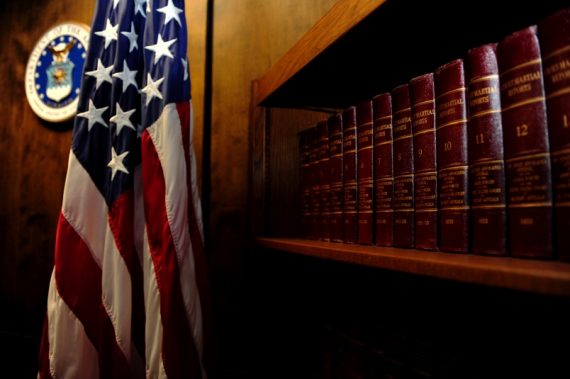

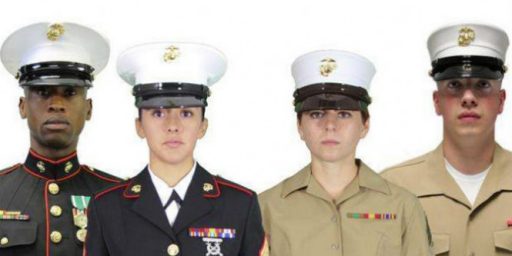

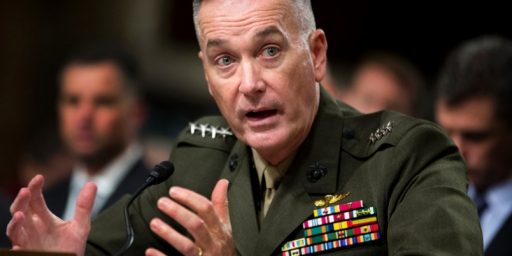
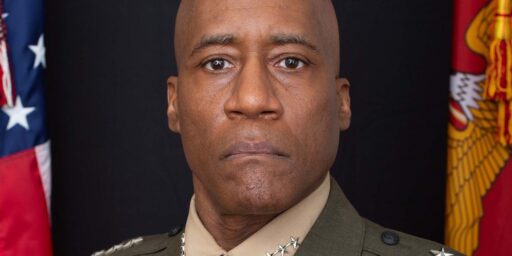
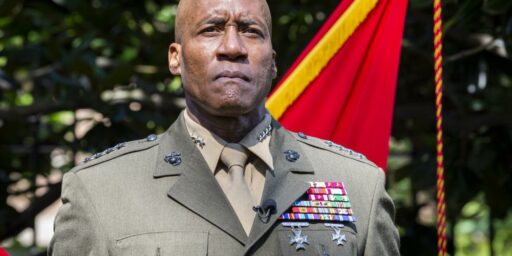
In other words, the military did a crap job overseeing that actual sexual assuault was prosecuted correctly and punishment doled out properly, and when the command structure forcefully tells the military to start treating it as the serious issue it should be treated it as, it’s undue command influence, making sure that actual sexual assault gets treated crappy yet again, and letting off sexual abusers and possibly rapists off the hook entirely – yet again.
Got it.
@EddieInCA:
Catch-22* revisited.
* – and just about every other satire written by someone who had been in the military including, but not limited to: Green, Graham; Vonnegut, Kurt; Harrison, Harry.
For the individual called to serve as a member (mil-speak for ‘juror’, I believe) of a Courts Martial there is a duty to give a considered verdict separate from the most recent speech by the Commandant.
Your position (and that of the members quoted above) that the average Courts Martial should be considered unable to reach a true verdict if the chain of command made policy statements regarding the importance of discipline being extended to sexual assault indicates that you and I share a low opinion of the average time-serving military careerist.
I have hoped at times that the all volunteer force would have changed the service from the way I found it in 1964-68. But I will assume that you are correct in the lack of honor you ascribe to military jurors. 50 years have passed and nothing has changed.
While I can see the legal argument based on the statute as written, I think there has to be an exemptions for “general policy statements” like this one. If you extrapolate that you can’t punish a soldier for dropping a cigarette but on the parade ground because the commandant has made base maintenance an improvement goal in last years Christmas address.
James, I am with you 100 percent on this one. I was an NCO in the Army for 20 years. I have spent a number of years at a major command headquarters. I understand how command influence works, especially with officers, and especially field grade officers. I do not really expect the man-on-the-street to get this. I doubt that even someone who served a single term would get it.
I have to agree that most people who have never served underestimate the influence that can come from statements from their leaders. If you want to stay in the military and advance up the command structure, you do what they want. If they want rape convictions, they will get rape convictions. That said, I do have to wonder if at some level this case isnt different. If memory serves, this isnt the first time a military leader has spoken out against sex abuse. And….not much changed. Unless lower level leaders really grasp this and believe it is a problem, I dont think things change much. As to the legal issue, it strikes me that you have an impasse. A Commandant will always have the responsibility to speak out against illegal troop activities. That can always be seen as undue influence.
Steve
That would be an understatement.
I am curious, where exactly his statement crossed the line to undue influence. What line or lines would need to be removed or altered to remove the undue influence alleged? Can the president or CMC even speak on the shameful way the military has handled sexual misconduct and not be accused of undue influence. I have to say that from the outside this ruling seems to support privilege, in this case the privilege to sexually assault and get away with a slap on the wrist.
@Grewgills:
The problem with the CMC’s statements are how specifically directive they are to senior members of the USMC, the same members who would sit on courts-martial panels and even convene courts-martial. When he says the statements of accused Marines are “bull shit” and that “80% of the time” there was an actual sexual assault, he’s essentially directing any Marine officers and staff NCOs who sit on courts-martial to dump the presumption of innocence. He’s saying “There’s an 80% probability the Marine sitting at the accused’s table in front of you is guilty.” That’s a huge presumption of guilt, right there.
I must say I agree with you regarding the military’s crap record dealing with sexual assault, and therefore I understand why you would see this ruling that way. Still, we have to maintain a court-martial system that’s as fair as possible, and the CMC’s statements, while entirely on point, could result in less-than-fair proceedings. That’s why they constitute undue command influence.
@Mikey:
Taking the comments of various military people across multiple threads, one has to ask: Does this system make sense any more?
By that I mean, we live in an unprecedented age of communication. Today, effectively anything that a Commandant and/or Commander-in-Chief says will be available for all troops within days if not hours (whether or not it’s a direct address or not). Are we at the point where *anything* people in the chain of command says on a given subject can be seen as influencing all the troops underneath them?
It kinda feels that top brass cannot make any comments of weight on any criminal subject without potentially causing these problems. The very fact that simply publicly acknowledging that there is a problem and people are *not* being convicted can potentially lead to convictions over turned is mind boggling.
Seriously, how is it possible to change a culture without being able to actually talk about the problem?
Beyond that, if we’re discussion “fairness” we also need to have a discussion about what tends to happen to the careers of military members who were victims of sexual assault and are brave enough to try and “trust” the military justice system. By all accounts, for many, simply going to the MPs means the end of their military careers.
@Mikey:
So, even if that statement is 100% true and he could provide sourcing to back it up he should be barred from saying it? I am genuinely curious how he could have phrased his statement that would still convey his (needed) message and not cross over into undue influence. I understand the need for an impartial trial, but there is also the need to address the sexual assault issue. There must be a way to do that and if there isn’t then something needs to change.
@Grewgills:
I’m coming to the conclusion that it’s impossible — which is why I think finding a way to try these cases in civilian courts is the only long-run viable solution. Partly, that solves the problem of the “enabling culture”. It also solves the problem of undue influence.
Let’s put it a different way: how comfortable would you be if the police had their own courts and judges, and could only be tried by those courts? Why is this different?
@Matt Bernius:
The irony of this, re: the case that’s the subject of this post, is the CMC’s remarks apply perhaps more to the process leading up to a court-martial than the court-martial itself. The issue has really been that sexual assault cases have been getting quashed by commanders, without a court-martial being convened at all. That’s what the CMC means when he talks about removing CAs from the process in these cases–CA means “convening authority.” The perception (and perhaps truth) seen by Congress is commanders are sweeping sexual assault cases under the rug rather than convening courts-martial.
@Grewgills:
I’m not sure either. I mean, if there’s a problem with commanders not referring these cases to court-martial, he’s basically going to have to say “you need to start referring sexual assault cases to court-martial or Congress is going to take your convening authority away.” How else can he put it?
Maybe stopping at that point would have been better. He really wrecked the presumption of innocence with his 80% remark. I am sure he’s correct, but at the same time that’s an aggregate number and courts-martial should be decided on the individual merits of the case.
This might just be one of those rare instances when there isn’t a good answer. I can’t remember any time in my 20 years of service when something like this happened. I mean, there were cases of undue command influence, but those generally occur one or two steps up from the CA, not all the way at the top.
Q: So why did you Lt. feell the need to destroy the village and murder its inhabitants?
A: Well, our commander in chief said we needed to wn this war against the evil empire which threatens our civilization.
Judge: You are free to go due to undue command influence.
@the Q: Umm, that has nothing whatsoever to do with UCI.
James,
Let me see if I can take this thing in the Gestalt…..what undue command influence in this case pertains to is tainting the outcome of the jury decision in that jurors would beleve that somehow they would be disobyeing some command that, whatever the evidence, they would be influenced to make a choice, not based on the inherent evidence of the case but rather the dictates of a superior, is that about right?
In other words, screw the evidence at hand, lets kiss the commander’s ass since thats the military way. And in this case, the commander thinks that most “consensual” sex is really rape, therefore, lets not judge the evidence at hand, lets just do what makes the command staff happy.
Hence, writ large, anything a lowly soldier does, i.e. my example, why can’t they extrapolate a small detail into excusing a larger behavior.
I really don’t think the commander was saying “find everyone guilty cause its PC right now”, he merely mentioned some stats.
How this judge can conflate that into some type of jury tampering is beyond me. As was previously asked “how could he have phrased his statement that would still convey his (needed) message and not cross over into undue influence.” I think thats a good question.
@the Q: You seem to be willfully ignoring the evidence. The UCMJ is quite clear as to what constitutes UCI. This easily qualifies.
If POTUS or CMC ordered something clearly illegal, officers and NCOs would be expected to understand that and ignore it. If it were slam dunk that the accused were innocent, they’d presumably acquit, Heritage speech be damned.
The problem here is that POTUS and CMC have explicitly shifted the presumption away from innocence of the accuse unless guilt is proven beyond reasonable doubt to one where the accuser is presumed 80% likely to be right. Beyond that, they’ve ordered that sentencing be the maximum regardless of exculpatory and mitigating circumstances. That’s in violation of the law, much less due process.